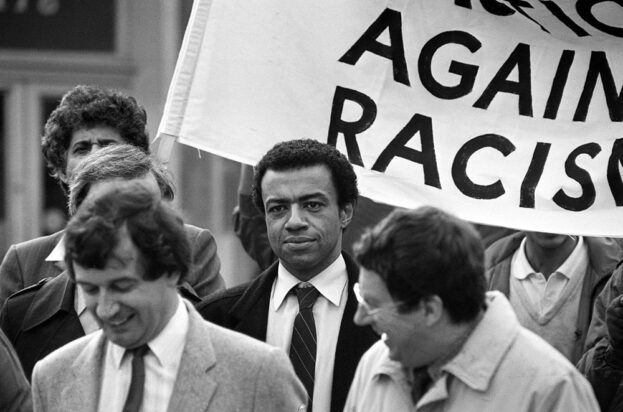
There are moments in history when the course shifts, when a figure emerges who doesn’t just walk through doors but leaves them wide open for others. Paul Yaw Boateng, Baron Boateng, is one such figure. His journey is one of firsts, of courage, and of an unyielding belief in justice. The first Black Cabinet Minister in British history, Paul Boateng is more than a politician—he’s a symbol of possibility, of what can be achieved when barriers are met not with resignation but with resolve.
A Childhood in Two Worlds
Paul Boateng’s story begins in Hackney, London, where he was born on 14 June 1951 to Kwaku Boateng, a prominent Ghanaian lawyer and politician, and his Scottish mother. His heritage was a blend of two worlds, one steeped in the fight for African independence and the other shaped by Britain’s colonial legacy. His early years were spent in Ghana, a newly independent nation under the leadership of Kwame Nkrumah. This period, marked by optimism and struggle, left an indelible impression on him.
But this childhood was interrupted by political turmoil. In 1966, a military coup overthrew Nkrumah’s government, and Paul’s father was imprisoned without trial. At just 15 years old, Paul fled Ghana with his family, returning to Britain. These experiences of displacement and injustice forged his resolve to fight for fairness and equality—a thread that runs through every chapter of his life.
Settling in Hemel Hempstead, Boateng attended Apsley Grammar School. It was here that his intellectual curiosity and drive began to take shape. Later, at the University of Bristol, he studied law, immersing himself in the academic world while laying the foundation for a career that would combine legal advocacy with activism. Boateng’s legal training was not just a pathway to a profession but a tool for challenging systemic injustice. He reflected on this transition, stating:
“I never intended to become a politician, that was the furthest thing from my mind. But legal activism…led me to a place where I said: Look, it’s not enough to simply be seeking justice in the courts, you have to try and embed justice – social justice, economic justice, criminal justice – within the system itself. And that meant getting involved politically.”
Building a Legal Career Grounded in Justice
Boateng’s legal career began under the mentorship of Benedict Birnberg, a renowned civil rights advocate. This period saw him representing individuals and communities facing systemic injustice, from housing disputes to police complaints. One of his most notable cases involved representing Cherry Groce, the mother of six who was shot and paralysed by a police officer during a raid on her home. This case, emblematic of broader tensions between the police and African-Caribbean communities in Britain, highlighted Boateng’s commitment to justice.
He became a partner at B.M. Birnberg & Co., and later practised as a barrister at Eight King’s Bench Walk. His involvement in campaigns such as the Scrap Sus Campaign, which opposed discriminatory stop-and-search practices, positioned him as a leading figure in civil rights advocacy. This work deepened his understanding of the systemic barriers faced by marginalised communities, reinforcing his belief in the need for structural change.

Breaking Ground in Politics
In 1987, Paul Boateng entered Parliament as the MP for Brent South, alongside Diane Abbott, Bernie Grant, and Keith Vaz. This historic moment marked the election of the first Black and Asian MPs in modern British history. Boateng’s victory speech captured his vision for change:
“Today Brent South, tomorrow Soweto!”
This statement, connecting local struggles for justice with the global fight against apartheid in South Africa, epitomised his approach to politics: rooted in local communities yet expansive in its scope and ambition.
As an MP, Boateng quickly established himself as a passionate advocate for social justice. Representing one of the most diverse constituencies in the country, he championed issues ranging from housing to racial equality. His ability to articulate the concerns of his constituents while addressing national and international challenges earned him widespread respect.
Ministerial Milestones
When Labour came to power in 1997, Paul Boateng made history as the UK’s first Black government minister, serving as Parliamentary Under-Secretary for Health. His portfolio included social services, mental health, and disabled people—a testament to his commitment to supporting the most vulnerable in society. He introduced guidelines to prevent racial discrimination in adoption and worked tirelessly to improve social care systems.
In 1998, Boateng was promoted to Minister of State at the Home Office, where he tackled issues such as crime, drug policy, and youth engagement. He became the first Minister for Young People, launching initiatives like the Youth, Citizenship, and Social Change programme. This £450 million project aimed to address social exclusion and promote citizenship among young people, reflecting Boateng’s belief in the transformative power of opportunity.
In 2002, Boateng achieved another milestone as Chief Secretary to the Treasury, becoming the first Black Cabinet Minister in British history. Reflecting on this achievement, he said:
“My colour is part of me, but I do not choose to be defined by it.”
As Chief Secretary, he oversaw critical spending reviews and played a key role in shaping public services. He was also a vocal advocate for international development, championing increased aid to Africa and supporting initiatives like the Millennium Development Goals.
Diplomatic Leadership
In 2005, Boateng transitioned to diplomacy, serving as British High Commissioner to South Africa. His appointment carried immense symbolic weight—a Black Briton representing the UK in a nation still grappling with the legacy of apartheid. In this role, Boateng worked to strengthen UK-South Africa relations while addressing broader African development challenges. He was a vocal critic of the Zimbabwean government’s human rights abuses and a tireless advocate for trade policies that supported African economies.
Boateng’s tenure as High Commissioner was marked by a deep commitment to building bridges between nations and fostering dialogue. Reflecting on the challenges and opportunities of this role, he stated:
“I am honoured to be asked to take on this role, especially as it comes at such an integral time for our relationship with South Africa and the African continent.”
A Voice in the Lords
In 2010, Paul Boateng was elevated to the House of Lords, taking the title Baron Boateng of Akyem and Wembley. In his maiden speech, he called for greater support for disadvantaged children, urging the government to prioritise their needs in the face of economic challenges. Throughout his time in the Lords, he has continued to advocate for social justice, poverty alleviation, and international development.
A Legacy Beyond Politics
Paul Boateng’s influence extends far beyond the political sphere. As a Methodist lay preacher, he has drawn on his faith to guide his activism and community work. His involvement in organisations like the English National Opera, BookAid International, and the University of Greenwich reflects his commitment to education, the arts, and cultural exchange.
He has also mentored young leaders, recognising the importance of inspiring the next generation to take up the mantle of change. His reflections on systemic racism capture his enduring belief in the power of collective action:
“There’s still systemic racism in our society. It’s a fact of life. But what I know is, we don’t have to accept it as a fact and that it is possible to make a difference. Change never comes about because of one person. It never comes about because of elites. Change comes about because people determine that it should happen… All of us have the capacity and the potential to be change makers. It’s when we recognise that that change happens.”
A Lasting Impact
Paul Boateng’s legacy is one of courage, vision, and transformation. From his early years in Ghana to his groundbreaking political career and diplomatic service, he has consistently challenged the status quo, paving the way for a more just and inclusive society. His life stands as a testament to what can be achieved when barriers are not just overcome but dismantled.
Today, as Britain continues to grapple with questions of identity, diversity, and justice, Paul Boateng’s story offers a powerful reminder of the importance of representation and the enduring impact of principled leadership. His journey—from a young boy fleeing political upheaval to a statesman shaping the future—is a beacon of hope and inspiration for generations to come.
